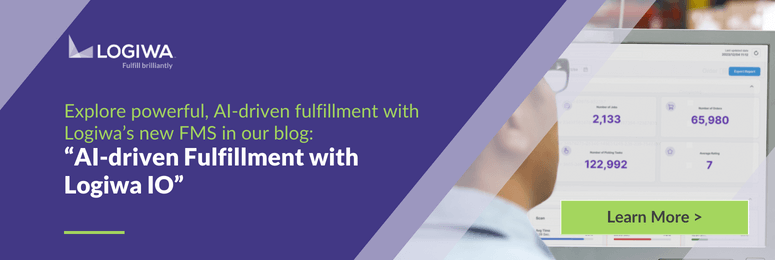The use of Artificial Intelligence (AI) in fulfillment operations is rapidly transforming the world of logistics. As companies aim to be more efficient, accurate, and keep their customers happy, AI is emerging as a transformative force.
AI is fast turning into the key to improving operations and gaining a competitive edge. It’s reshaping what it means to excel in warehousing and supply chain management. In this blog, we’ll dive into how artificial intelligence is revolutionizing fulfillment operations and the benefits of embracing AI innovation.
Key Takeaways
- AI is revolutionizing logistics by optimizing operational efficiency, cost savings, and adapting to dynamic consumer expectations and demand.
- AI in fulfillment logistics is rapidly growing, with the market expected to reach $407 billion by 2027, setting new consumer expectations for efficiency and customization.
- AI helps enhance complex order management, hybrid B2B and DTC operations, inventory management, transportation logistics, and more.
- AI enhances ecommerce fulfillment by streamlining order management, optimizing inventory, improving labor planning, and boosting operational throughput and accuracy.
- Logiwa IO’s AI-driven Job Optimization can boost task efficiency by as much as 58%.
Contents
AI’s Role in Fulfillment: A Game-Changing Evolution
AI’s growing presence in the logistics landscape marks a significant shift towards more responsive and efficient operations. It caters to the dynamic demands of the ecommerce market and promotes higher levels of operational efficiency and cost savings.
According to Statistica, AI influenced 17% of all online orders during peak season months last year. AI’s role in fulfillment logistics is only going to grow and advance. AI is among the fastest growing markets today, with the AI market projected to reach $407 billion by 2027.
Just like with same-day and next-day deliveries, consumer expectations are sure to be influenced by the efficiency gains and customization improvements achieved by AI-powered operations. In order to meet the latest logistics standards, operations must be prepared to increase their use of AI—or start using it if they haven’t already.
9 Ways AI Streamlines Fulfillment Logistics
If you have not already made AI part of your fulfillment operations, it can feel like a daunting task. But the truth is that AI can be leveraged by any sized operation with relative ease. It’s become increasingly accessible and, depending on your pace of adoptions, quickly benefits your operations.
Here are nine ways AI improves ecommerce fulfillment operations:
AI Simplifies Complex Order Management
Complex order management becomes streamlined with AI integration. By interfacing with various ecommerce platforms, AI algorithms effectively manage high-volume, multi-channel orders and help warehouses process complicated orders with ease.
AI’s ability to analyze trends and anticipate market shifts significantly enhances the accuracy and timing of order processing as well. The sophistication offered by AI-driven systems is a major improvement over traditional methods as it ensures a more responsive and intuitive order management approach.
AI Enhances Hybrid B2B and DTC Operations
In today’s market, the ability to simultaneously manage business-to-business (B2B) and high-volume single- and multiple-item direct-to-consumer (DTC) orders is crucial. Hybrid fulfillment operation requires strategic planning, smart automation, and ongoing workflow optimization to achieve success.
The integration of AI becomes an invaluable asset in this process. It continuously improves processes with unmatchable intelligence to ensure the structured and dynamic needs of hybrid operations are balanced. This results in efficiency, adaptability, and minimal errors when handling the diverse demands of both B2B and DTC orders.
AI Optimizes Inventory Management
AI-driven predictive analytics optimizes the process of managing inventory for ecommerce orders. AI systems analyze patterns and correlate data from various sources to create a highly accurate forecast of inventory needs. It can also help manage quality control and improve returns processing to improve results long term.
By forecasting inventory needs, AI can suggest optimal stock levels and identify reordering points. This prevents overstocking or stock shortages. Paired with real-time inventory tracking, AI ensures you are able to maintain accurate inventory levels.
AI Improves Labor Planning and Workforce Efficiency
The integration of AI into labor planning transforms workforce management in fulfillment centers. AI algorithms not only analyze workforce activity to optimize performance; they can also help you predict future staffing needs.
By comparing various data points, AI is able to enhance workforce planning so labor management strategies are more effective and efficient. This is especially important for seasonal fluctuations and changes in demand. In an industry faced with high turnover rates, AI keeps staffing levels optimized.
AI Maximizes Throughput
AI’s impact on throughput in fulfillment centers is a game-changer. Advanced AI algorithms not only streamline standard processes like picking, packing, and shipping but also bring in predictive modeling and real-time decision-making capabilities. This results in a significantly higher volume of orders being processed more efficiently, with reduced wait times and faster turnaround.
AI job optimization, in particular, showcases how intelligent systems can outperform manual operations, leading to significant gains in operational efficiency. In comparison to manually created job waves, Logiwa IO’s AI Driven Job Optimization has proven AI can boost task efficiency by as much as 58%.
Boosts Accuracy in Order Fulfillment
AI minimizes errors and enhances accuracy in order fulfillment. Automated processes backed by AI and machine learning improve precision in daily warehouse tasks. For example, it can direct tasks in a way that lowers the risk of errors occurring or flag mistakes as they occur.
This is particularly important for complex DTC operations, where human error can be costly. AI’s ability to continuously learn and adapt ensures the accuracy of fulfilled orders improves over time.
Enables Predictive Maintenance
AI-driven predictive maintenance is crucial for logistics equipment management. These systems predict equipment failures, schedule maintenance, and avoid operational downtime. They can also provide actionable insights for preventive maintenance.
This capability is crucial in avoiding unexpected downtimes and prolonging the life of essential equipment. It can lead to significant cost savings and improved operational continuity, as well as enhanced operational efficiency.
Powers Smart Routing and Transportation Logistics
AI plays a crucial role in optimizing delivery routes and logistics planning. For logistics operations, this can mean ensuring the ideal fulfillment centers are processing orders based on consumer address, stock availability, delivery times, and more.
By analyzing traffic patterns, weather conditions, and delivery schedules, AI algorithms can also determine the most efficient carriers and routes for shipping orders. This optimization leads to faster delivery times, reduced fuel consumption, and overall lower transportation costs for enhanced customer satisfaction and profitability.
Ensures Better Customer Service and Support
AI-enabled customer service systems are redefining the support landscape. These systems not only offer real-time order tracking but also provide automated, yet personalized, responses to customer inquiries. The efficiency and accuracy of AI-driven support elevate the customer service experience, ensuring faster resolutions and improved satisfaction levels.
Embracing AI with Fulfillment Management Systems (FMS)
The transformative role of AI in fulfillment operations is clear. From enhancing inventory management to improving customer service, AI sets new standards in efficiency and accuracy.
Getting started with AI is easy with a system like Logiwa IO because it’s already part of our platform.
AI in Action: Enhancing Operational Dynamics
In fulfillment centers, AI-driven systems like Logiwa IO actively optimize various operational aspects. From real-time data analysis to intelligent inventory management, our platform ensures ongoing optimization for higher rates of efficiency. Its ability to provide predictive analytics and optimize routing and logistics exemplifies the AI-driven enhancement.
The Human-AI Synergy
A vital aspect of AI in fulfillment centers is the creation of a symbiotic relationship between human workers and AI systems. By handling repetitive and data-intensive tasks, AI allows the human workforce to focus on more strategic and creative aspects of operations. This includes forming high-efficiency picking and packing tasks, and directing workflows while improving labor standards. This synergy leads to a more dynamic, flexible, and efficient workforce.
AI and the Customer Experience
In today’s market, customer expectations are not just about product quality; they extend to the delivery experience. AI-powered systems like Logiwa IO enhance customer satisfaction by supporting real-time tracking, personalized interactions, and efficient problem resolution. This customer-centric approach is a cornerstone of Logiwa IO, aligning with the evolving demands of the ecommerce landscape.
Navigating Market Challenges with AI
The ecommerce world faces numerous challenges, from rapidly changing consumer behaviors to intense competition. AI helps businesses navigate these challenges by offering agile and adaptable solutions. Logiwa IO’s AI-backed Cloud-native, headless, and serverless solution embodies these qualities. It enables businesses to stay ahead of ever-changing market needs and make operational changes with ease.
AI’s evolution continues to bring more sophisticated applications in warehouse and supply chain management. Logiwa provides an advanced AI solution for ecommerce businesses and third party logistics (3PL) providers.
Discover Logiwa IO’s AI technology and transform your fulfillment operations. Visit www.logiwa.com/why-logiwa to learn how our innovative features can transform your order fulfillment process.
FAQs about AI for Fulfillment Operations
How does AI improve order processing in fulfillment centers?
Artificial Intelligence (AI) significantly enhances order processing in fulfillment centers by introducing sophisticated automation and data analytics capabilities. By leveraging AI, businesses can automate complex fulfillment services, minimizing the need for manual intervention. This automation streamlines workflows, leading to faster and more efficient order processing.
AI algorithms analyze historical data to predict future order trends, allowing for proactive management of resources. Additionally, AI contributes to higher accuracy in order fulfillment, reducing errors and ensuring customer satisfaction. The technology can process large amounts of data quickly and make intelligent decisions. This is beneficial for fulfillment centers that want to enhance their order processing systems.
Can warehouse AI help reduce operational costs?
By optimizing inventory management, AI ensures that stock levels are maintained efficiently, reducing the costs associated with overstocking or stockouts. AI-driven predictive analytics also help forecast demand, enabling better inventory planning and order processing.
In labor management, AI tools can enhance workforce productivity and reduce the time spent on manual tasks, leading to lower labor costs. Additionally, AI enables predictive maintenance, which involves using data to predict equipment failures before they occur.
Is AI integration complex in existing fulfillment systems?
The complexity of integrating AI into existing fulfillment systems can vary, but innovative solutions like Logiwa IO are designed to simplify this process. Logiwa IO incorporates AI as an integral component of its architecture, making it an accessible add-on feature for users. The system is tailored for smooth adoption, allowing it to integrate seamlessly with existing fulfillment operations and other AI-powered tools.
This integration capability ensures minimal disruption to ongoing operations. Logiwa IO’s user-friendly interface and intuitive design further ease the transition, enabling warehouse staff to quickly adapt to the new technology. Additionally, Logiwa IO’s compatibility with various platforms and its ability to synchronize with different systems make it an adaptable solution for warehouses looking to leverage AI.
How can a company start with AI in their warehouse?
For companies looking to incorporate AI into their warehouse operations, the first step is to conduct a thorough assessment of existing systems and identify areas where AI can add the most value. Exploring AI-driven solutions like Logiwa IO, which offers a range of features specifically designed for various fulfillment operations, makes the process even easier.
Consulting with AI and logistics experts can provide valuable guidance on the most effective implementation strategies. When planning the integration, it’s beneficial to adopt a phased approach, starting with simpler applications and gradually introducing more complex AI features. This step-by-step adoption allows for smoother transition and staff acclimatization.
Logiwa revolutionizes fulfillment with its AI-powered, cloud-based solutions, designed for high-volume networks, direct-to-consumer brands, and 3PLs.
Warehouse Management
Modern digital WMS powers a modern fulfillment experience







